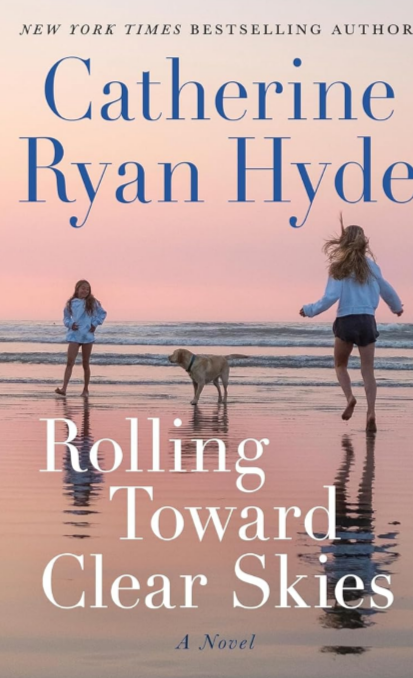Title: Rolling Toward Clear Skies
Author: Catherine Ryan Hyde
Publisher: Lake Union Publishing
Pages: 293
My GoodReads Rating: ⭐⭐
Alex, a registered nurse, and
Dr Margaret ‘Maggie’ Blount run Doctors on Wheels, along with a doctor couple,
John and Lacey Bishop. The four voluntarily head out to areas affected by
natural calamities, and offer medical aid to those in need, without charging a
cent.
During one such trip to
Louisiana, the site of a hurricane, Maggie treats two newly orphaned sisters,
16-year-old Jean and 13-year-old Rose, who are suffering from pneumonia. She
finds herself drawn to the two girls and chooses to take them home.
Predictably, Maggie’s
daughters, 16-year-old Willa and 13-year-old Gemma aren’t happy. Already in a
conflict-ridden relationship with their mother, they lash out at their mother’s
decision to foster/adopt the two girls and go off to stay with their father.
Will this group of conflicted
individuals ever become a true family?
I have read this author’s work
before and have found her writing to be engaging. Unfortunately, this was far
from her best work. The story lacked depth and I found so many issues that
didn’t sit right.
The doctors are supposed to be
helping victims of natural disasters. Although the anchor, Eleanor Price,
commends their bravery, we never get the sense of them being in any real
danger. The book sees them through a hurricane and a wildfire, but the danger
is always past by the time they get there.
Even the trauma that Jean and
Rose suffer, of which we hear a lot, is not something that we see in the
present, not even in a flashback. It’s just something we are told about.
The descriptions do nothing to
make the scenes come alive. The dialogues were cheesy and banal in some cases,
and unreal in others, sounding almost like a counselling psychology textbook.
Utterly unlike the way normal people would speak.
I didn’t like any of the
characters. Not one. They all came across as fake and flat. Jean and Rose have
no flaws. They are just so perfect. On the other hand, there’s no let up to the
selfishness of Willa and Gemma, no redeeming qualities whatsoever.
Alex was so passive, he was
totally unnecessary. Early on, he tells Maggie that Jean and Rose are his
favourites among Maggie’s daughters.
Maggie was so ‘good’, it was
unbelievable. Especially with the attempts to set the parents of Jean and Rose
as being terribly flawed. The girls talking to Maggie as if she was some great
saviour was off-putting.
The anchor, Eleanor, was so
brash, I wanted to slap her. I couldn’t imagine why Maggie would choose to
invite her to do follow up stories with her family.
The only character who stood
out miles above the others was Sunny, the little stray that Rose adopts.
Maggie couldn’t seem to make
up her mind about Jean and Rose. She flitted back and forth between calling
them fostered and adopted. At one point, she told Eleanor that they had been
officially adopted. And then, a few pages later, the word, fostered, was used
again.
Maggie’s motivation for
adopting or fostering the girls was unclear. Why was she so taken up with them?
Naturally, her daughters were upset with their mother.
Speaking of the girls, miffed
at their mother’s actions, they go to their dad’s house and return more than
ten months later. During that time, there is no mention of school. Presumably,
they went to school while at their dad’s house, but there was no mention of
school for Jean and Rose during those nine months. No mention of the challenges
they might have faced. Not even one sentence to say they even went to school.
Also, during that period, as
Maggie informs Eleanor, she doesn’t go to work, apparently to help Jean and
Rose to adjust. Adjust to what? Willa and Gemma are away, so there are no
challenges. How does Maggie earn a living during that period? How does she
sustain her lifestyle, including the big house with the swimming pool? She
returns to her clinic only at the 88 percent mark in the book. So what does she
do during those ten-odd months?
The first chapter, with the
interview with Eleanor, is one long and elaborate ‘tell’ exercise. It is boring
and the worst way to seek to engage the reader in the lives of the characters.
Maggie does not recognize her
own mother just because she has had some work done on her face.
The book has its heart in the
right place, the idea that family is irreplaceable and that nothing else
matters quite as much, but it takes too long, and the most circuitous route, to
establish that. Not exactly an engaging story.
Of course, there is a happy
ending, but though the characters’ emotions are wrung through, I was just glad
it was over.
(I read this book on NetGalley. Thank you to the author, the publisher and NetGalley.)

No comments:
Post a Comment